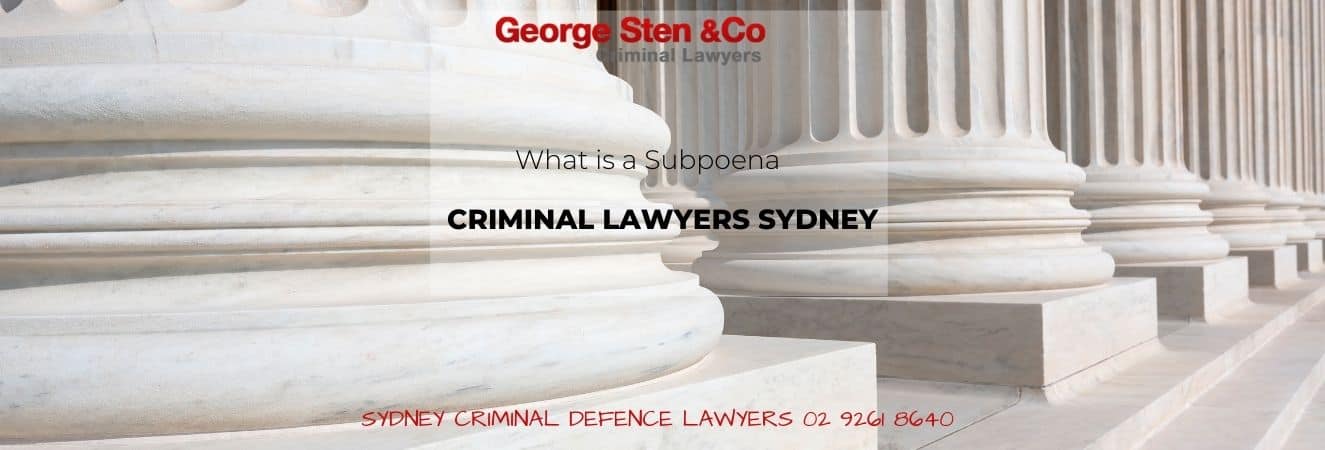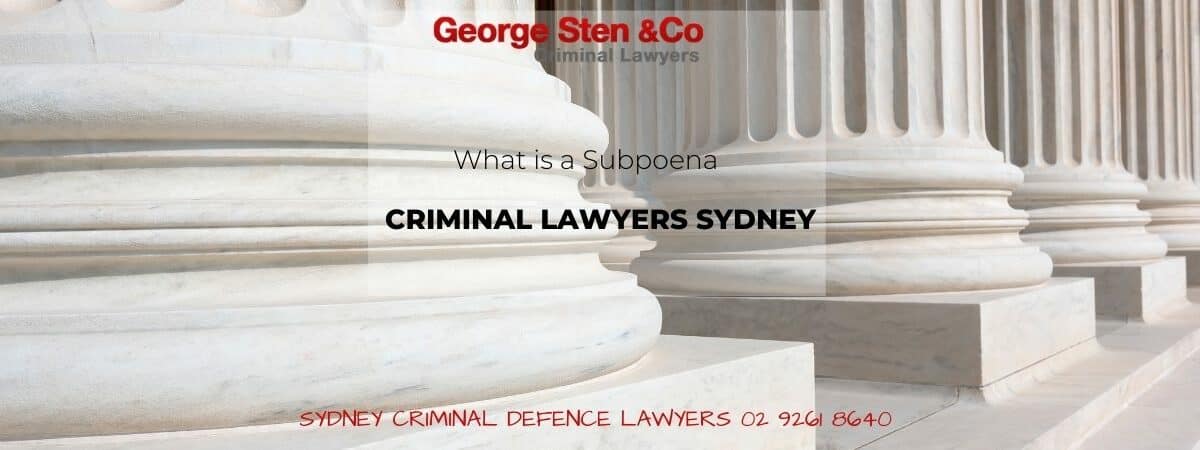What is a subpoena?

What is a subpoena?
Subpoena in NSW
A subpoena is a court order requiring a party to produce documents, give evidence or both in order to prove a matter in issue in a case. For example, a party may subpoena another party to provide bank statements to prove that a certain amount of money was transferred from one party to another at a certain time.
If you have been served with a subpoena or intend to subpoena another party, it will be essential to ensure that it complies with the relevant court rules and law. George Sten & Co Criminal Lawyers are specialists in criminal law and can advise and defend you if you have been charged or think you may be charged with an offence or require assistance.
During legal proceedings, a party may apply to the relevant court. Applying for a subpoena means the party is applying to the court for an order addressed to a third party to produce certain documents or to attend court to give evidence or to do both. In criminal proceedings, often the police or prosecutor will subpoena a party for documents or to give evidence. A defendant may also subpoena the police or another party for documents or to give evidence.
This means there are 3 types of subpoenas:
- A subpoena which requires a person or legal entity to produce documents
- A subpoena requiring a person to attend court and to give evidence
- A subpoena requiring a party to produce documents and to attend court to give evidence

If a subpoena requires you to produce something, it must provide an adequate description of what is required as well as the time and place for it to be produced. You are then obligated to produce the relevant documents if available.
If a subpoena has not been served properly, the relevant party may not be required to produce the documents required or provide evidence in accordance with the subpoena.
When serving a subpoena, this must be done in accordance with the applicable court rules.
The District Court Rules 1973 provide that a subpoena may be effected:
- By handing it to the person, or
- If the person is an inmate of a correctional centre, by handing it to the officer in charge of the correctional centre or by sending it by post or facsimile or other electronic transmission to the officer in charge, or
- If the person is a police or public officer, by sending it by post or facsimile to the person’s business address or by sending it by electronic communication to the person’s business email address or
- If the person is not a police or public officer, by sending it by post or facsimile to the person’s residential address or by sending it by electronic communication to the person’s email address or
- With the consent of the relevant legal practitioner, by leaving it at the relevant legal practitioner’s address for service or by sending it to that address by post or facsimile or by sending it to the legal practitioner’s email address for service by electronic communication.
Often a party may be reluctant to receive a subpoena. If you are handing a subpoena to that party, they may indicate that they are refusing to accept the subpoena. If this is the case, the subpoena may legally be served by putting it down in the person’s presence after the person has been told of the nature of the subpoena. Once this is done, the party will then be legally obligated to comply with the subpoena in that respect.
A subpoena to give evidence may be served on a party which requires them to attend court on the date and time provided in the subpoena. If the party served with a subpoena fails to attend court on the relevant date, an arrest warrant may be issued for them to be brought before the court. Failing to comply with a subpoena may result in the party being found guilty of contempt and they may be liable for any costs caused by not complying with the subpoena.
If you have been served with a subpoena, it is possible to object to producing whatever is being requested by the subpoena. If the documents being requested in a subpoena are irrelevant to the matter in issue, are privileged, or the terms of the subpoena are too broad then you should object to producing the requested documents.
A subpoena cannot be used by a party to find out if certain documents exist and this is not the purpose of a subpoena.
For more information or to speak with a criminal defence lawyer, call George Sten & Co Criminal Lawyers. We are available to defend you in court and ensure your rights are properly protected. Call (02) 9261 8640 or 0412 423 569 to speak with one of our criminal law experts.

